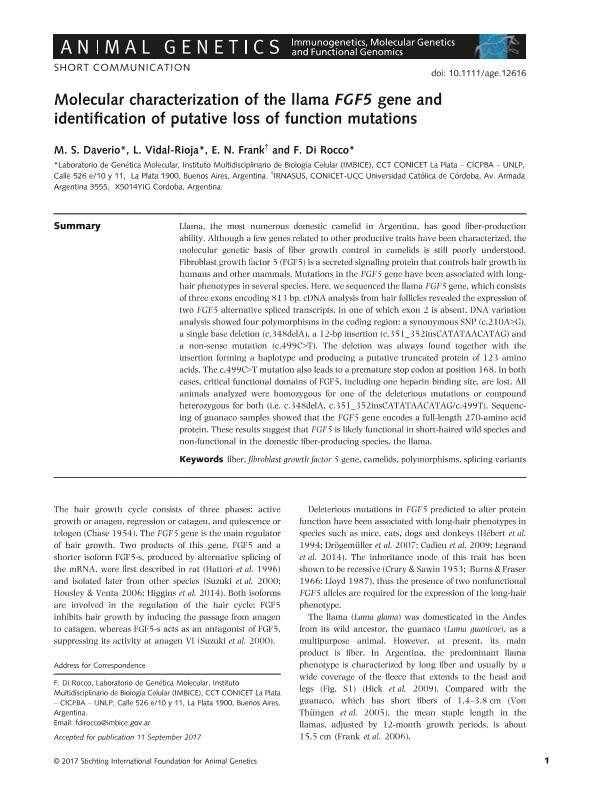Mostrar el registro sencillo del ítem
dc.contributor.author
Daverio, Maria Silvana

dc.contributor.author
Vidal Rioja, Lidia
dc.contributor.author
Frank, Eduardo Narciso

dc.contributor.author
Di Rocco, Florencia

dc.date.available
2018-12-05T18:28:09Z
dc.date.issued
2017-12
dc.identifier.citation
Daverio, Maria Silvana; Vidal Rioja, Lidia; Frank, Eduardo Narciso; Di Rocco, Florencia; Molecular characterization of the llama FGF5 gene and identification of putative loss of function mutations; Wiley Blackwell Publishing, Inc; Animal Genetics; 48; 6; 12-2017; 716-719
dc.identifier.issn
0268-9146
dc.identifier.uri
http://hdl.handle.net/11336/65886
dc.description.abstract
Llama, the most numerous domestic camelid in Argentina, has good fiber-production ability. Although a few genes related to other productive traits have been characterized, the molecular genetic basis of fiber growth control in camelids is still poorly understood. Fibroblast growth factor 5 (FGF5) is a secreted signaling protein that controls hair growth in humans and other mammals. Mutations in the FGF5 gene have been associated with long-hair phenotypes in several species. Here, we sequenced the llama FGF5 gene, which consists of three exons encoding 813 bp. cDNA analysis from hair follicles revealed the expression of two FGF5 alternative spliced transcripts, in one of which exon 2 is absent. DNA variation analysis showed four polymorphisms in the coding region: a synonymous SNP (c.210A>G), a single base deletion (c.348delA), a 12-bp insertion (c.351_352insCATATAACATAG) and a non-sense mutation (c.499C>T). The deletion was always found together with the insertion forming a haplotype and producing a putative truncated protein of 123 amino acids. The c.499C>T mutation also leads to a premature stop codon at position 168. In both cases, critical functional domains of FGF5, including one heparin binding site, are lost. All animals analyzed were homozygous for one of the deleterious mutations or compound heterozygous for both (i.e. c.348delA, c.351_352insCATATAACATAG/c.499T). Sequencing of guanaco samples showed that the FGF5 gene encodes a full-length 270-amino acid protein. These results suggest that FGF5 is likely functional in short-haired wild species and non-functional in the domestic fiber-producing species, the llama.
dc.format
application/pdf
dc.language.iso
eng
dc.publisher
Wiley Blackwell Publishing, Inc

dc.rights
info:eu-repo/semantics/openAccess
dc.rights.uri
https://creativecommons.org/licenses/by-nc-sa/2.5/ar/
dc.subject
Camelids
dc.subject
Fiber
dc.subject
Fibroblast Growth Factor 5 Gene
dc.subject
Polymorphisms
dc.subject
Splicing Variants
dc.subject.classification
Otras Ciencias Veterinarias

dc.subject.classification
Ciencias Veterinarias

dc.subject.classification
CIENCIAS AGRÍCOLAS

dc.title
Molecular characterization of the llama FGF5 gene and identification of putative loss of function mutations
dc.type
info:eu-repo/semantics/article
dc.type
info:ar-repo/semantics/artículo
dc.type
info:eu-repo/semantics/publishedVersion
dc.date.updated
2018-10-22T21:50:48Z
dc.journal.volume
48
dc.journal.number
6
dc.journal.pagination
716-719
dc.journal.pais
Reino Unido

dc.journal.ciudad
Londres
dc.description.fil
Fil: Daverio, Maria Silvana. Consejo Nacional de Investigaciones Científicas y Técnicas. Centro Científico Tecnológico Conicet - La Plata. Instituto Multidisciplinario de Biología Celular. Provincia de Buenos Aires. Gobernación. Comisión de Investigaciones Científicas. Instituto Multidisciplinario de Biología Celular. Universidad Nacional de La Plata. Instituto Multidisciplinario de Biología Celular; Argentina
dc.description.fil
Fil: Vidal Rioja, Lidia. Consejo Nacional de Investigaciones Científicas y Técnicas. Centro Científico Tecnológico Conicet - La Plata. Instituto Multidisciplinario de Biología Celular. Provincia de Buenos Aires. Gobernación. Comisión de Investigaciones Científicas. Instituto Multidisciplinario de Biología Celular. Universidad Nacional de La Plata. Instituto Multidisciplinario de Biología Celular; Argentina
dc.description.fil
Fil: Frank, Eduardo Narciso. Universidad Católica de Córdoba. Instituto de Investigaciones en Recursos Naturales y Sustentabilidad José Sanchez Labrador S. J. Consejo Nacional de Investigaciones Científicas y Técnicas. Centro Científico Tecnológico Conicet - Córdoba. Instituto de Investigaciones en Recursos Naturales y Sustentabilidad José Sanchez Labrador S. J.; Argentina
dc.description.fil
Fil: Di Rocco, Florencia. Consejo Nacional de Investigaciones Científicas y Técnicas. Centro Científico Tecnológico Conicet - La Plata. Instituto Multidisciplinario de Biología Celular. Provincia de Buenos Aires. Gobernación. Comisión de Investigaciones Científicas. Instituto Multidisciplinario de Biología Celular. Universidad Nacional de La Plata. Instituto Multidisciplinario de Biología Celular; Argentina
dc.journal.title
Animal Genetics

dc.relation.alternativeid
info:eu-repo/semantics/altIdentifier/url/http://doi.wiley.com/10.1111/age.12616
dc.relation.alternativeid
info:eu-repo/semantics/altIdentifier/doi/https://dx.doi.org/10.1111/age.12616
Archivos asociados
